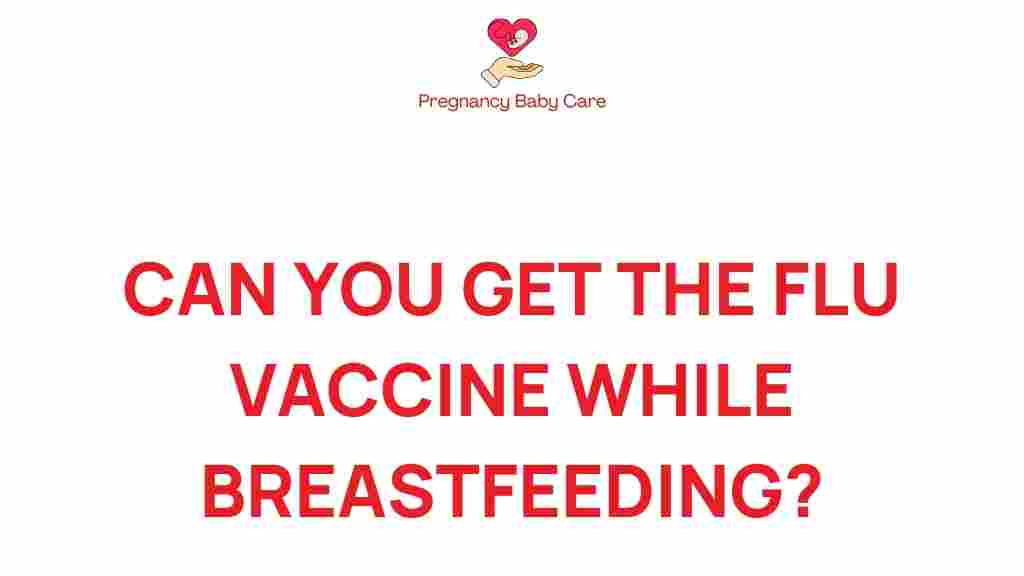The Flu Vaccine and Breastfeeding: What You Need to Know
As flu season approaches, understanding the relationship between the flu vaccine and breastfeeding is crucial for new mothers. Vaccination plays a vital role in maternal health and infant immunity, helping to protect both mother and baby during the flu season. In this article, we will explore the importance of the flu vaccine, its safety for breastfeeding mothers, and how it contributes to public health. We will also provide health guidelines and tips for new moms navigating this important topic.
Why the Flu Vaccine is Important
The flu vaccine is an essential preventive measure during the flu season. Influenza can lead to severe illness, hospitalization, and even death, particularly in vulnerable populations such as infants and breastfeeding mothers. Here are some key reasons why the flu vaccine is important:
- Protects maternal health: Pregnant and postpartum women are at a higher risk for complications from the flu.
- Boosts infant immunity: Vaccinating mothers can help protect their infants from the flu through breast milk.
- Reduces flu transmission: Widespread vaccination can decrease the overall incidence of flu in the community.
Flu Vaccine and Breastfeeding: Safety Considerations
One of the most common concerns among new mothers is whether the flu vaccine is safe while breastfeeding. The Centers for Disease Control and Prevention (CDC) and other health organizations recommend the flu vaccine for breastfeeding mothers. Here’s why:
- No risk to the baby: Studies show that the flu vaccine does not pose any risk to breastfeeding infants.
- Antibodies transfer: Vaccinated mothers pass antibodies to their infants through breast milk, enhancing their immunity.
- Recommended by health guidelines: The CDC and WHO advocate flu vaccination for nursing mothers as part of maternal health care.
The Process of Getting Vaccinated as a Breastfeeding Mother
If you are a breastfeeding mother considering the flu vaccine, here’s a step-by-step process to guide you:
- Consult your healthcare provider: Discuss your health history and any concerns regarding vaccination.
- Choose the right vaccine: The flu vaccine is available as an injection or nasal spray, but the injection is recommended for breastfeeding mothers.
- Schedule your vaccination: Aim to get vaccinated before the onset of flu season, ideally in early fall.
- Follow up: Keep track of any side effects you may experience and report them to your healthcare provider.
Benefits of Vaccination for Maternal Health
Vaccination during breastfeeding is not only safe but also beneficial for maternal health. Here are some of the advantages:
- Reduces illness severity: Vaccinated mothers are less likely to experience severe flu symptoms.
- Improves recovery: If a vaccinated mother does contract the flu, she is likely to recover more quickly.
- Enhances overall health: Keeping mothers healthy is crucial for effective breastfeeding and caring for their infants.
Infant Immunity: The Role of Maternal Vaccination
The flu vaccine not only protects mothers but also plays a significant role in enhancing infant immunity. Here’s how:
- Passive immunity: Infants receive antibodies through breast milk when mothers are vaccinated.
- Lower flu rates: Infants whose mothers are vaccinated are less likely to contract the flu.
- Longer protection: The antibodies passed through breast milk can provide several months of protection for the infant.
Public Health Impact of Vaccination
The flu vaccine significantly contributes to public health. Here are some of the broader impacts:
- Herd immunity: Widespread vaccination helps protect those who cannot be vaccinated, such as very young infants.
- Reduce healthcare burden: Fewer flu cases mean less strain on healthcare systems, especially during peak flu season.
- Economic benefits: Reducing flu cases can save millions in healthcare costs and lost productivity.
Troubleshooting Common Concerns About the Flu Vaccine
Many breastfeeding mothers may have concerns about side effects or the vaccine’s impact on their babies. Here are some common concerns and solutions:
Concern: Will the vaccine affect my milk supply?
Solution: Research indicates that the flu vaccine does not affect milk production or quality.
Concern: What if I experience side effects?
Solution: Common side effects include mild soreness at the injection site, low-grade fever, or fatigue. These symptoms typically resolve within a few days.
Concern: Can my baby have an allergic reaction?
Solution: Allergic reactions to the flu vaccine are rare. If your baby shows signs of an allergic reaction, consult your pediatrician.
Health Guidelines for Breastfeeding and Vaccination
To ensure the best outcomes for both mother and infant, follow these health guidelines:
- Vaccinate early: Aim to get vaccinated before flu season starts.
- Promote breastfeeding: Continue breastfeeding as it provides essential nutrients and antibodies to your baby.
- Stay informed: Keep up with public health recommendations regarding flu vaccinations and breastfeeding.
Conclusion
In conclusion, the flu vaccine is a crucial component of maternal health that greatly benefits both breastfeeding mothers and their infants. With the flu season approaching, it’s important for new moms to understand the safety and efficacy of the flu vaccine during breastfeeding. By getting vaccinated, mothers can protect themselves and enhance their infants’ immunity, contributing to better public health outcomes.
For more information on maternal health and vaccination, you can visit the CDC website. Remember, keeping up with health guidelines and prioritizing vaccination can significantly impact the well-being of mothers and their children during flu season.
As a breastfeeding mother, taking proactive steps to ensure your health and the health of your baby is paramount. Make informed decisions, consult healthcare professionals, and embrace the benefits of vaccination this flu season.
This article is in the category Health and created by PregnancyBabyCare Team
